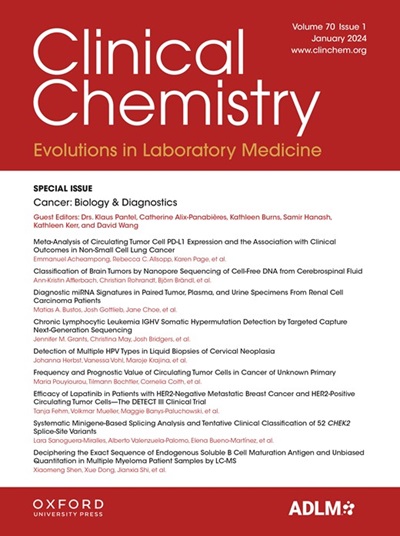A-206 Instilling Diagnostic Stewardship through Pathology Resident Triage of Referral Testing
IF 6.3
2区 医学
Q1 MEDICAL LABORATORY TECHNOLOGY
引用次数: 0
Abstract
Background Formal laboratory directorship education varies amongst institutions. Typically lecture-based curriculum highlights core competencies including: scientific knowledge, management and leadership skills, quality assurance and regulatory compliance, ethics, safety, and budgeting and financial management. Our institution has implemented clinical pathology call (“Keeper of the Beeper” or “KOB call”) to prepare pathology residents to investigate transfusion reactions, positive meningitis panels, critical lab values, as well as referral testing triage. The referral testing triage emphasizes the budgeting and financial management competency by learning how to manage lab resources and help ensure that the lab continues to operate within their financial means while maintaining a high level of patient care and providing direct experiences in clinical consultation to other medical services. Methods Referral tests, which cost greater than $1000, are evaluated to assess the utility and medical necessity. This evaluation process includes review of the patient’s chart to find the clinical indication for the test ordered, and in some cases, discussion with the clinical team and ordering physician if the indication was not clear from initial chart review. Information regarding the patient’s status of inpatient or outpatient was documented. After complete evaluation, the test was either approved, rejected, and/or provision of alternate testing options were provided. Tests greater than $1000 and on the Department of Pathology referral testing formulary are eliminated from evaluation and automatically approved. Results Over an 8-month period, 8 tests were rejected for send out referral testing through our triaging protocol. The reasons for rejections included: redundancy (n=2), incorrect order (n=1), non-contributory (n=2), deviation from standard of care (n=2), or research purposes (n=1). Of note, 5 of the 8 rejected tests were ordered in the inpatient setting, for which institutional billing of these non-indicated tests would have directly affected our department budget. The rejected tests resulted in total direct savings of $21,175. Conclusion Lab triage of send out tests is a crucial aspect of laboratory management to ensure both efficiency and diagnostic stewardship in providing patient care. While our data are somewhat limited, we are observing trends in a positive direction that demonstrates the value that Pathology Residents are able to provide while gaining firsthand exposure to the roles of a laboratory director. The implementation of this protocol has yielded valuable insight into frequently ordered tests, allowing us to expand the pre-approved list in our formulary. These data also serve as a critical resource should the decision be made to bring these tests in-house. We believe this is a model that could be easily replicated at other academic medical centers and should be considered as a tool for teaching aspects of diagnostic stewardship in Pathology Residency programs.A-206通过病理学住院医师分类转诊测试灌输诊断管理
正式的实验室主任教育因机构而异。通常以讲座为基础的课程强调核心能力,包括:科学知识、管理和领导技能、质量保证和法规遵从、道德、安全、预算和财务管理。我们的机构已经实施了临床病理呼叫(“传呼员”或“KOB呼叫”),以准备病理住院医师调查输血反应,阳性脑膜炎面板,关键实验室值,以及转诊检测分诊。转介测试分类强调预算和财务管理能力,通过学习如何管理实验室资源,并帮助确保实验室在保持高水平的患者护理和为其他医疗服务提供临床咨询的直接经验的同时,继续在其财务能力范围内运作。方法对费用超过1000美元的转诊检查进行评估,以评估其效用和医疗必要性。这一评估过程包括审查患者的病历,以找到所订购的测试的临床适应症,在某些情况下,如果从最初的病历审查中不清楚适应症,则与临床团队和订购医生进行讨论。记录了患者的住院或门诊情况。在完成评估后,测试被批准、拒绝和/或提供替代测试选项。超过1000美元的测试和病理学部推荐测试处方将从评估中剔除并自动批准。结果在8个月的时间里,通过我们的分诊方案,8项测试被拒绝进行转诊测试。拒绝的原因包括:冗余(n=2)、顺序不正确(n=1)、非贡献性(n=2)、偏离护理标准(n=2)或研究目的(n=1)。值得注意的是,8个被拒绝的测试中有5个是在住院环境中订购的,因此这些非指示性测试的机构账单将直接影响我们部门的预算。拒绝接受的测试直接节省了21 175美元。结论实验室分诊是实验室管理的一个重要方面,以确保在提供患者护理的效率和诊断管理。虽然我们的数据有些有限,但我们正在观察一个积极的趋势,这表明病理学住院医师能够提供的价值,同时获得第一手的实验室主任的角色。该协议的实施对经常订购的测试产生了宝贵的见解,使我们能够在我们的处方中扩大预先批准的清单。如果决定在内部进行这些测试,这些数据也可以作为关键资源。我们相信这是一种模式,可以很容易地在其他学术医疗中心复制,并且应该被视为病理学住院医师项目中诊断管理教学方面的工具。
本文章由计算机程序翻译,如有差异,请以英文原文为准。
求助全文
约1分钟内获得全文
求助全文
来源期刊

Clinical chemistry
医学-医学实验技术
CiteScore
11.30
自引率
4.30%
发文量
212
审稿时长
1.7 months
期刊介绍:
Clinical Chemistry is a peer-reviewed scientific journal that is the premier publication for the science and practice of clinical laboratory medicine. It was established in 1955 and is associated with the Association for Diagnostics & Laboratory Medicine (ADLM).
The journal focuses on laboratory diagnosis and management of patients, and has expanded to include other clinical laboratory disciplines such as genomics, hematology, microbiology, and toxicology. It also publishes articles relevant to clinical specialties including cardiology, endocrinology, gastroenterology, genetics, immunology, infectious diseases, maternal-fetal medicine, neurology, nutrition, oncology, and pediatrics.
In addition to original research, editorials, and reviews, Clinical Chemistry features recurring sections such as clinical case studies, perspectives, podcasts, and Q&A articles. It has the highest impact factor among journals of clinical chemistry, laboratory medicine, pathology, analytical chemistry, transfusion medicine, and clinical microbiology.
The journal is indexed in databases such as MEDLINE and Web of Science.
 求助内容:
求助内容: 应助结果提醒方式:
应助结果提醒方式:


